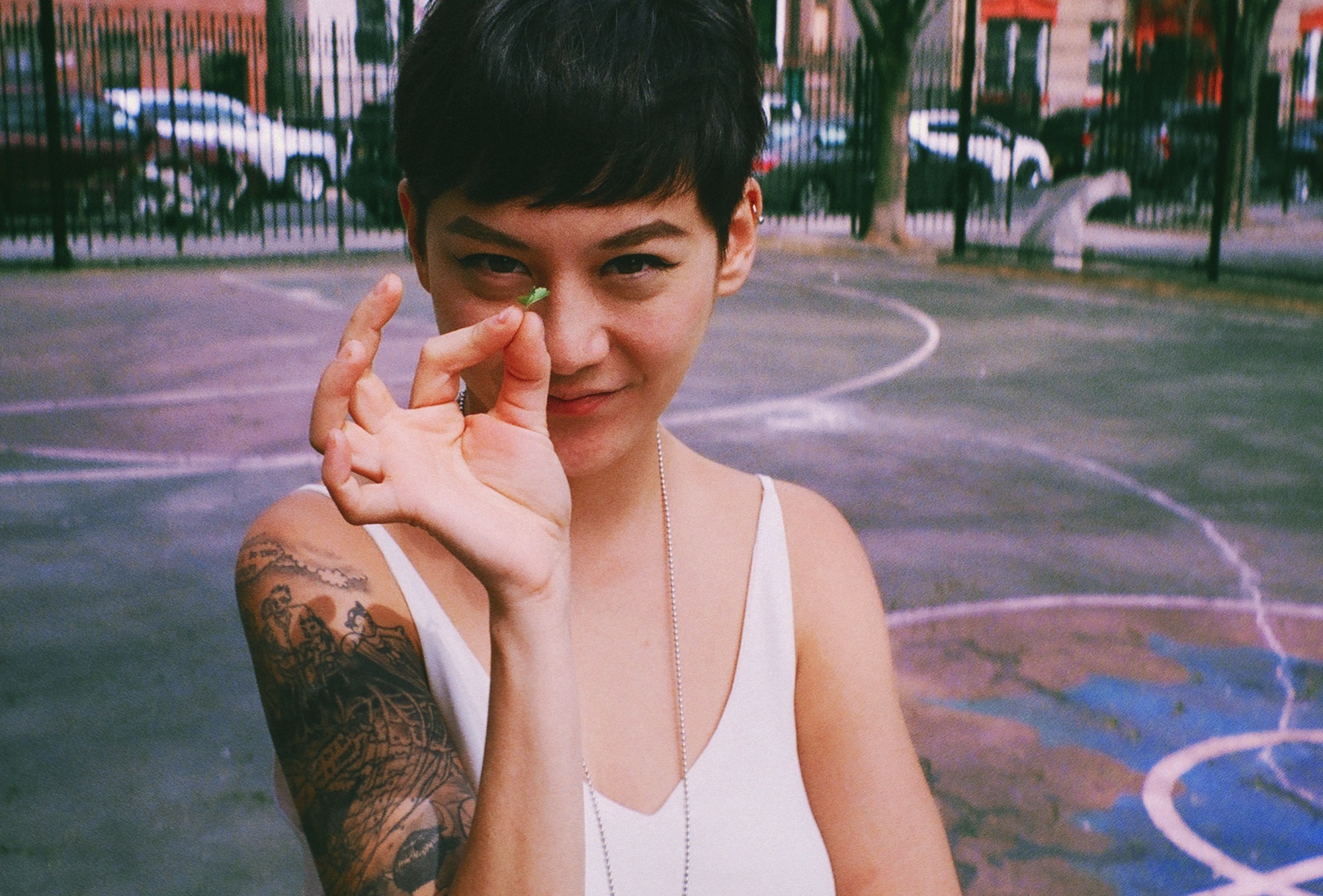Recently, I found some snapshots my mother took when she and my dad were living in Oregon in the mid 80s. He’d switched coasts to attend Lewis and Clark College; her journey was a little longer — nearly 5,000 miles from her native small-town Ireland. The photographs capture my mother’s ongoing fascination with her adopted America’s landscape; my father appears only in fields or dwarfed by towering trees, always under an endless stretch of blue. That same shade of sky drew me so viscerally to Psychopomp, Michelle Zauner’s just-released album under her solo side project Japanese Breakfast. Its cover artwork — Zauner tells me when we meet — is a found photograph of her own mother, her arms reached out underneath a broad stroke of cerulean sky. She raised the now New York-based musician in rural Oregon’s forests after emigrating from Korea.
Psychopomp‘s specialness is apparent in its first listen — a plunge into atmospheric tones and textures of thoughtfully layered electronic elements stitched together with direct acoustic melodies. Its moments of shimmering shoegaze and sharply attuned songwriting have netted comparisons to sounds as varied as The Smashing Pumpkins, Asobi Seksu, The Sundays, and Sky Ferreira. The sum of these parts is impressive, but somehow Psychopomp still manages to evade that whole, instead pursuing something more personal. Though it’s technically Zauner’s official full-length debut as Japanese Breakfast, its tracks have been in the making for years.
In the midst of a 2014 album cycle for Little Big League — the indie rock four piece Zauner fronted with guitarist Kevin O’Halloran — her mother was diagnosed with aggressively advancing cancer. Zauner made the decision to leave behind Little Big League and traveled back to Oregon to look after her mother during her final days. “It was a really, really ugly, sad, terrible time,” Zauner tells me of the nearly full year she spent back home. “She went through two chemotherapy treatments and didn’t want to do any more after [the treatments] didn’t really do anything — we just had to accept it. She died within six months of getting diagnosed.”
After her mother’s death, Zauner found herself “in this big house in the woods with my dad,” understandably unable to jump on the next plane back to Philadelphia. “At what point do you feel like someone’s okay enough — or you’re okay enough — to leave that kind of environment?” So she became her dad’s support system, helping him clear out her mom’s clothes, prepare to sell the house, and pack up old photographs. “That was when I sort of started putting the record together,” Zauner says. “It was the one thing I had for myself.”

Many of Psychopomp‘s tracks originally appeared on Where is My Great Big Feeling and American Sound, movingly confessional cassette projects Zauner released as Japanese Breakfast in the summer of 2014. “A lot of those songs were written or recorded in a day,” she explains, “demos of stuff I just wanted to get out on paper.” Those early efforts provide the groundwork to this record’s more complex, ultimately more compelling sound. Take for example “Triple 7,” Psychopomp‘s closing track reborn from a frank acoustic demo into a collection of lilting harmonies piercing through swaths of hazy synths; or “Jane Cum,” a heartbreakingly heavy cut that now couches its melancholic riff in a leveling wall of static. “Once I had this distance, I was able to go back to the raw material and pick which songs stuck with me after letting them go for a year — which ones I wanted to revisit,” said Zauner.
Though the enigmatic record’s sound has become fuller bodied — Zauner arranged its instrumentation with a larger band and worked with producer Ned Eisenberg — her lyrics largely remain consistent across the projects. Which is just as fortunate, because Zauner’s unflinching writing might be her biggest strength. The images she conjures are at once sharply specific and broadly evocative. “Call out my name/ Like something from the bottom of a well,” she sings on “Triple 7.” “How I want, how I need/ How I cling to your sleeves/ Till they’re like lacerated sails/ But in the night I am someone else.”
“I might be reading into this a little bit,” Zauner offers, “but I was largely raised by an immigrant parent whose second language was English, so I never learned any idioms growing up. I think in a lot of ways I was drawn to really simple American imagery and sayings because it’s stuff that feels really foreign to me,” she explains. Psychopomp is also owed in part to the lyrics of classic country songs — the “exaggerated female longing,” so enshrined by singers like Tammy Wynette. “I was really drawn to that feeling of being completely incapable of living without someone,” Zauner said of the so-called Tragic Country Queen. But it’s the record’s title that best classifies not only its sound, but its reason for being.
Though Pyschopomp‘s opening track, “In Heaven,” boasts something of a sunny structure, it emerged from a particularly trying aspect of Zauner’s grief. “I was really frustrated with adults consoling me in this way of, ‘She’s in a better place, she’s in heaven.’ My dad truly believed that and it helped him, but I don’t believe in a God and I don’t believe in an afterlife,” she explains. After closing herself off to any sort of spirituality left her with a coldness, Zauner realized she “had to figure out a way of accepting some kind of quiet spirituality to cope with her death in my own private way.” She started seeing a Jungian analyst and began reading Carl Jung’s work on dreams, where she happened across the term “psychopomp.”
“I didn’t know what it was, I just liked it because it sounded like ‘psychotic pop,’ which I think is what the record sounds like. But if you delve deeper, a psychopomp in ancient mythology is an usher of the dead. It’s this spirit that guides a person to death without any kind of judgment,” Zauner explains. “When I was living in Oregon, that was really how I felt. I couldn’t judge my mom for doing only two treatments because that was her decision. Even though my dad was upset and wanted to encourage her to keep doing it, I really just had to be there as a support system without any kind of judgment and sort of help her die.” For Jung, the psychopomp is something of a mediator between conscious and unconscious worlds — another layer of meaning for Zauner. “A lot of my spirituality lay in that I liked to believe that when I was having dreams about my mom, it was her way of visiting me.”
To Zauner, the record’s cover image, in which her mother’s arms are stretching out under that vast, open sky, represents the dualities of that dreamlike state. “It makes me feel like she’s reaching out to me — being taken away and not wanting to go, but also being gone already and striving to have a presence.” In confronting these deeply personal questions, struggles, and losses, Zauner has created hope for others.”People come up to me and say, ‘Thank you so much, this record has meant a lot for me. I lost my father or grandmother or mother and it was really helpful to grieve with you,'” she explains. “I hope people can relate to it, dance to it, cry to it — whatever helps people through hard times.”
Credits
Text Emily Manning
Photography Zachary Chick
